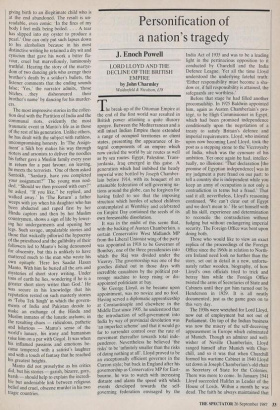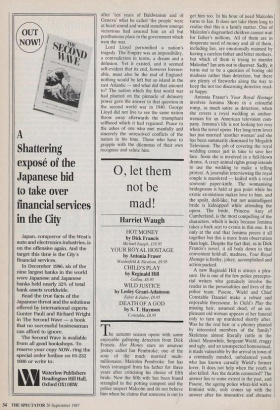Personification of a nation's tragedy
J. Enoch Powell
LORD LLOYD AND THE DECLINE OF THE BRITISH EMPIRE by John Charmley
Weidenfeld & Nicolson, £18
The break-up of the Ottoman Empire at the end of the first world war resulted in British power attaining a quite illusory apogee. Between the Mediterranean and a still intact Indian Empire there extended a range of occupied territories or client states, presenting the appearance of in- tegral components of an empire which now circled the world by air routes as well as by sea routes. Egypt, Palestine, Trans- jordania , Iraq emerged in this guise. A generation which had imbibed the heady imperial wine bottled by Joseph Chamber- lain before 1914, with its bouquet of an attainable federation of self-governing na- tions around the globe, can be forgiven for having failed to see that the imposing structure which hordes of school children contemplated at Wembley and celebrated on Empire Day contained the seeds of its own foreseeable dissolution.
It was in the midst of this scene that, with the backing of Austen Chamberlain, a certain Conservative West Midlands MP from the Liberal Unionist wing of the party was appointed in 1918 to be Governor of Bombay, one of the three presidencies into which the Raj was divided under the Viceroy. The governorship was one of the goodies dished out in those days with incredible casualness by the political pat- ronage machine to keep rising or dis- appointed politicians at bay. Sir George Lloyd, as he became upon appointment, was no novice and no fool. Having served a diplomatic apprenticeship at Constantinople and elsewhere in the Middle East since 1905, he understood that the introduction of self-government into India by way of provincial devolution was `an imperfect scheme' and that it would go far to surrender control over the rate of movement thereafter towards total inde- pendence. Nevertheless he believed 'the risks' to be 'infinitely smaller than the risks of doing nothing at all'. Lloyd proved to be an exceptionally efficient governor in the Curzon style; but back in England after his governorship as Conservative MP for East- bourne, he was to watch with increasing distaste and alarm the speed with which events developed towards the self- governing federation envisaged by the India Act of 1935 and was to be a leading light in the pertinacious opposition to it conducted by Churchill and the India Defence League. Yet all the time Lloyd understood the underlying fateful truth: `Either responsibility must become a sha- dow or, if full responsibility is attained, the safeguards are worthless.'
Before that stage he had filled another proconsulship. In 1925 Baldwin appointed him, again as Austen Chamberlain's pro- tégé, to be High Commissioner in Egypt, which had been promised independence conditionally upon the negotiation of a treaty to satisfy Britain's defence and imperial requirements. Lloyd, who insisted upon now becoming Lord Lloyd, took the post as a stepping stone to the Viceroyalty of India, which was the cynosure of his ambition. Yet once again he had, intellec- tually, no illusions: 'That declaration [the promise of Egyptian independence] was in my judgment a pure fraud on our part: to tell a country she is independent while you keep an army of occupation is not only a contradiction in terms but a fraud.' That said it all; nevertheless, Lloyd's reasoning continued, 'We can't clear out of Egypt and we don't mean to.' He set himself with all his skill, experience and determination to reconcile the contradiction without fudging but without endangering imperial security. The Foreign Office was bent upon doing both.
Those who would like to view an exact replica of the proceedings of the Foreign Office since the 1960s in relation to North- ern Ireland need look no further than the story, set out in detail in a new, unfortu- nately rather wooden, biography, of how Lloyd's own officials tried to trick and betray him while the Foreign Office twisted the arms of Secretaries of State and Cabinets until they got him turned out by Henderson in 1929. It is all neatly documented, just as the game goes on to this very day.
The 1930s were wretched for Lord Lloyd, now out of employment but not out of Parliament. On top of the Indian business was now the misery of the self-deceiving appeasement in Europe which culminated at Munich. Though an admirer and well- wisher of Neville Chamberlain, Lloyd ranged himself after Munich with Chur- chill, and so it was that when Churchill formed his wartime Cabinet in 1940 Lloyd sat down in Joseph Chamberlain's old chair as Secretary of State for the Colonies. There was more to come. In January 1941 Lloyd succeeded Halifax as Leader of the House of Lords. Within a month he was dead. The faith he always maintained that after 'ten years of Baldwinism and of Geneva' what he called 'the people' were at heart sound and would somehow emerge victorious had assured him an all but posthumous place in the government which won the war.
Lord Lloyd personified a nation's tragedy. The Empire was an impossibility, a contradiction in terms, a dream and a delusion. Yet it existed, and it seemed self-evident that its end, however foresee- able, must also be the end of England: nothing would be left but an island in the east Atlantic — and what did that amount to? The nation which the first world war had planted on the pinnacle of delusory power gave the answer to that question in the second world war in 1940. George Lloyd did not live to see the same nation throw away afterwards the triumphant selfhood which it had regained. Peace to the ashes of one who met manfully and sincerely the unresolved conflicts of the nation in his time. Those who have to grapple with the dilemmas of their own recognise and salute him.































































 Previous page
Previous page